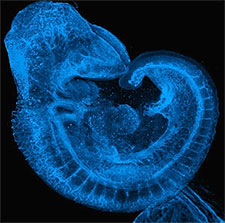Second "Evolution Matters" Lecture Focuses on Genetic Patterns of Embryos, Kinship among Species
January 10, 2008
By Paul K. Mueller
How does variation in genes generate the beautiful and astounding diversity of animal body shapes on Planet Earth?

"Embryos and Evolution" is the second lecture in the Evolution Matters series, and explores "the deep and profound kinship among species." The free public lecture is set for 6:30 p.m. on Jan. 24 in the San Diego Natural History Museum.
That biological puzzle, among others, will be explained in the second of the "Evolution Matters: The Diversity of Development" lectures, scheduled for 6:30 p.m. on Thursday, Jan. 24, at the San Diego Natural History Museum in Balboa Park.
Presented by the Division of Biological Sciences at UC San Diego, "Embryos and Evolution" will feature William J. McGinnis, professor of cell and developmental biology and the Herbert Stern Endowed Chair in biology.
The lectures are free and open to the public. Registration begins at 6 p.m. in the museum.
In the upcoming lecture, "Embryos and Evolution," McGinnis discusses the genetic patterns that bind all living creatures in a "deep and profound kinship" just now being understood.
A series of bizarre mutations in fruit flies, McGinnis says, led to the discovery that all animals, whether fish, fowl, or fly, share similar architectural control genes called Homeobox genes. "These genes instruct early embryos to develop eyes in the head, appendages in the middle, and excretory and sexual organs in the rear," he says. "They provide a pattern that evolution can build on to construct organisms of incredible diversity, beauty and complexity."
The discovery and study of Homeobox genes has opened "a new and beautifully complex window into the development of new life" and has led to an understanding of how subtle changes in Homeobox genes can lead to changes in animal form during evolution.
"Most satisfying," McGinnis says, "is that they have revealed a deep and profound kinship between all species, no matter how different they appear on the outside, that was invisible until biologists began to study the genes that control embryonic development."

William J. McGinnis, professor of cell and developmental biology and the Herbert Stern Endowed Chair in biology at UC San Diego, will explain how genetic patterns lead to organisms "of incredible diversity, beauty and complexity."
McGinnis is the co-discoverer (with Mike Levine) of homeoboxes, the sequences of DNA that are characteristic of homeotic genes, which play a central role in specifying body development. His current research uses both genetics and biochemistry to examine such questions as how molecular variations in the Hox genes that specify the head-tail pattern of an organism can generate variety in animal shapes during evolution, and what the molecular changes were that allowed single-celled animals to become multicellular. He has won numerous awards for the research that he and his students have done, including the Searle Scholar Award, the Presidential Young Investigator Award, and the Camille and Henry Dreyfus Foundation Teacher/Scholar Award.
The first lecture in the Evolution Matters series, "Clockwork Genes," was presented by Steve A. Kay, dean of Biological Sciences at UC Diego and held in November. Kay also participated in an online chat in December conducted by the San Diego Union-Tribune about "Why Evolution Matters" following his Op-Ed in the newspaper .
Why is it important to understand evolution? Because, Kay explains, "without a clear understanding of the principles and processes of evolution, our society would be unable to effectively produce food, treat infectious diseases, search for new ways to treat human genetic ailments, or find new drugs. By learning more about evolution, we've now learned more about how genes and biological systems interact, which ultimately improves our understanding of how to improve human health and food production, and provide sound environmental stewardship."
In each of the remaining lectures for "Evolution Matters: The Diversity of Development," leading scientists will focus on common evolutionary themes that underlie different biological systems and illustrate how these themes affect the health and development of plants, animals, and human beings.
Succeeding lectures in the "Evolution Matters" series, all to be held in the San Diego Natural History Museum in Balboa Park, are:
- "The Evolution of Complexity: From the Human Brain to the Rainforest," by Christopher Wills, at 6:30 p.m. on February 28, 2008.
- "Unraveling the Mysteries of Flower Formation," by Martin Yanofsky, at 6:30 p.m. on March 6, 2008.
- "The Genetics of Primate Evolution: A Rosetta Stone for Understanding Human Disease," by Ajit Varki, at 6:30 p.m. on April 24, 2008.
The lectures are sponsored in part by Amylin Pharmaceuticals and Kirin Pharma.
More information is available from "Evolution Matters: The Diversity of Development"